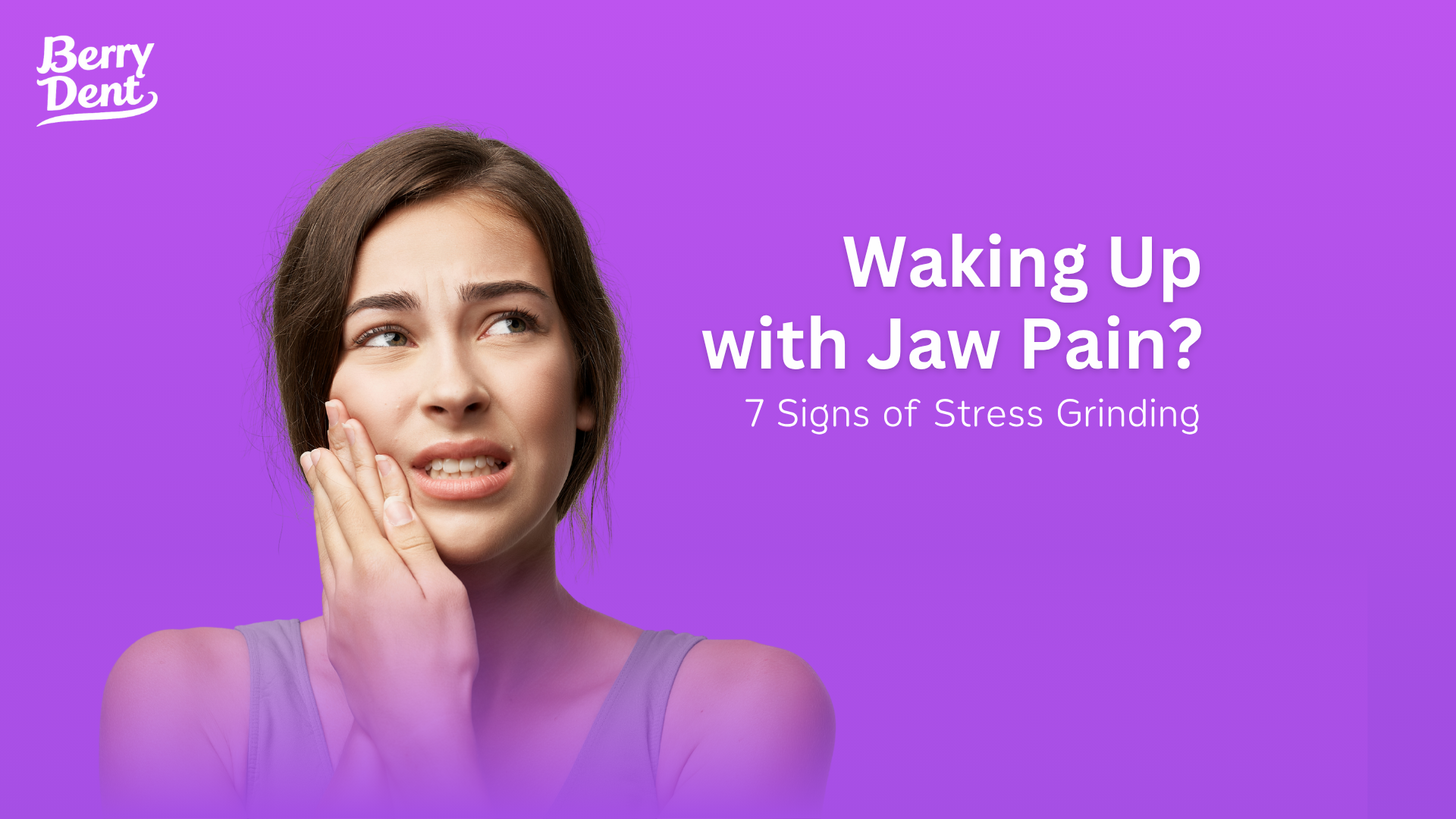Do you often wake up with a sore jaw or headaches? If so, you might be unknowingly grinding your teeth due to stress! This problem is not a minor issue and is a silent threat to many office workers, which is often overlooked. Berry Dent will help you check the symptoms and find ways to fix teeth grinding to stop the cycle of stress affecting your jaw, which damages both your dental health and your quality of life.
What is Teeth Grinding (Bruxism)? And Why Are Office Workers Especially at Risk?
Teeth grinding, medically known as Bruxism, is the unconscious clenching or grinding of teeth, mostly occurring during sleep. For office workers, the pressure from deadlines, stressful meetings, and staring at a computer screen for long hours are all sources of accumulated stress. When the brain is stressed, the body responds by tensing muscles, and the jaw muscles are one of the areas that bear the full impact, leading to severe teeth grinding at night.
Checklist: 7 Warning Signs – Do You Grind Your Teeth?
Check yourself to see if you have any of these teeth grinding symptoms:
- Waking Up with Jaw or Temple Pain
This is the clearest sign. Waking up feeling sore or with a dull ache in the jaw, temporomandibular joint (in front of the ear), or temple area because the muscles have been working hard all night.
- Abnormal Tooth Wear, Chipping, or Cracks
A dentist is often the first to notice this sign. Teeth may look abnormally short, have small chips at the edges, or in severe cases, have cracks on the tooth surface.
- Loud Grinding or Clenching Sounds During Sleep
Often, the person grinding their teeth is unaware, but their sleeping partner will hear an annoying “creaking” sound, which is the sound of teeth being forcefully rubbed together.
- Migraine-like Headaches in the Morning
The constant tensing of the jaw and temple muscles throughout the night can lead to dull or throbbing headaches in the morning.
- Increased Tooth Sensitivity
When teeth are worn down, the enamel, which is the outer protective layer, becomes thinner. This makes the underlying dentin more easily stimulated, leading to sensitivity when consuming hot, cold, or sweet things.
- Limited Mouth Opening or Clicking Sounds in the Jaw Joint
Feeling that your jaw is stiff in the morning, pain when opening your mouth wide, or a “clicking” or “popping” sound when you open or close your mouth are signs that the jaw joint is starting to function abnormally.
- Bite Marks on the Inside of Your Cheeks
Clenching your teeth can cause you to repeatedly bite the inside of your cheeks, leading to a whitish line along the bite line.
Unexpected Long-Term Effects of Teeth Grinding
If left untreated, teeth grinding can lead to serious problems such as permanent tooth damage, temporomandibular joint disorder (TMD), an enlarged masseter muscle that makes the face look more square, and it can affect sleep quality.
How to Fix Teeth Grinding and Reduce Jaw Pain Initially
Once you’ve confirmed you have teeth grinding symptoms, here are some initial solutions:
- Stress Management: The Root of the Problem
The best method is to address the root cause. Find relaxation techniques that work for you, such as meditation, exercise, listening to music, or reducing caffeine and alcohol before bed to reduce mental and physical tension.
- Wearing a Night Guard (Occlusal Splint)
This is the most recommended method by dentists. A night guard is a clear plastic device worn over the teeth at night to prevent the upper and lower teeth from making direct contact. It helps protect teeth from wear and reduces pressure on the jaw joint.
- Botox Injections in the Jaw Muscle
For severe cases, injecting Botulinum Toxin (Botox) into the masseter muscle can help relax the muscle’s function, reducing the bite force. This must be done by a qualified professional only.
While treating stress-related jaw clenching is important, protecting the tooth surface that may be damaged from grinding is something that cannot be neglected. Choosing a toothpaste that helps strengthen enamel is the best first line of defense. We recommend Berry Dent hybrid herbal toothpaste, which perfectly blends nature and science. Developed over 10 years of research, it has a unique formula of natural herbal extracts and 5 types of berries that care for gum health, along with 1500 ppm fluoride—the maximum amount that effectively strengthens enamel, making it resistant to wear and tear. It’s suitable for those who need ultimate protection to keep their teeth strong for any situation.


